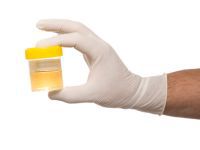Urinary Infection: Causes, Symptoms and Treatment
by Anita Mulher
 "Urinary tract infection (UTI) is an infection that affects any part of the urinary system, from the kidneys, the bladder to the urethra. It is defined as the presence of microorganisms in some part of that system. When it affects the kidneys, it is called pyelonephritis, when the bladder, it is called cystitis in the urethra it is urethritis, and when it affects the prostate, it is called prostatitis."
"Urinary tract infection (UTI) is an infection that affects any part of the urinary system, from the kidneys, the bladder to the urethra. It is defined as the presence of microorganisms in some part of that system. When it affects the kidneys, it is called pyelonephritis, when the bladder, it is called cystitis in the urethra it is urethritis, and when it affects the prostate, it is called prostatitis."
Causes, Symptoms and Treatment
The UTI can affect individuals of any age and sex, but it is far more common among women. This relationship is inverted in the first year of life when it is more common in boys. But why is UTI more frequent in women? This is probably due to anatomical factors. In women, the output of the urethra is very close to the entrance of the vagina, where it is known that the woman harbors many microorganisms in the vaginal flora.
In addition, poor hygiene after using the toilet, passing toilet paper into the anus and vagina favors the transport of intestinal microorganisms to the vulva. Another important factor is that the female urethra is much shorter than the male, which favors the path of bacteria from entering the urethra into the bladder.
UTI occurs primarily when microorganisms, bacteria in most cases, "climb" to reach the urethra and bladder, ureters and kidneys. The bacteria that most commonly cause UTI is called Escherichia coli, and is part of the normal intestinal flora. Thus, we can realize the importance of proper hygiene to prevent urinary infections.
Normally, urine does not contain any microorganism. The presence of any microorganism in the urine may lead to the development of UTI. Some people, especially women, may have bacteria in the urine and develop a UTI itself, being completely asymptomatic. These cases are called "asymptomatic bacteriuria" and are of particular importance in pregnant women, as we will comment further.
An extremely important factor in the development of UTI is urinary stasis. This happens when there is a difficulty emptying the bladder, and if urine accumulates for a long time. This favors the proliferation of bacteria in the urine, leading to the development of infection.
Some factors increase the chance of developing UTI, by facilitating the proliferation of bacteria. They are:
• Females;
- Pregnancy: there is a decrease in defense for women, in addition, during pregnancy there is an increase of progesterone (a female hormone), which causes a greater relaxation of the bladder and urinary stasis is favored;
- inadequate hygiene habits;
- Diabetes;
- Menopause: the woman's body changes to favor the development of UTI;
- Urinary obstruction: any condition that would prevent the constant flow of urine, such as enlarged prostate, birth defects, urinary calculi ("kidney stone"), tumors;
- Foreign bodies: the insertion of foreign bodies can carry bacteria to the urinary system;
- Neurological diseases: mechanisms interfere with the emptying of the bladder, promoting stasis of urine;
- Sexually transmitted diseases;
- gynecological infections.
Normally, urination (micturition) is voluntary and not accompanied by pain. The presence of some symptoms associated with urination leads the physician to consider a diagnosis of UTI. They are:
- Pain when urinating;
- Burning in urethra during urination;
- Difficulty starting urination;
- Urgency micturition, when the person feels a sudden urge to urinate;
- Need to urinate several times a day and in small quantities;
- urine with bad smell and/or discoloration;
- There may be elimination of blood in the urine, which is reddish brown.
The individual may feel pain in the lower abdomen, associated or not with the act of urinating. When the infection affects the kidneys, the picture is much more severe and the patient has fever, chills, back pain, nausea, vomiting.
Importantly, in children the symptoms are not always obvious and sometimes they show symptoms in areas unrelated to the urinary system. In children, we can find fever, poor appetite, stoppage of growth and weight loss.
The presence of any of these symptoms should lead to finding a doctor for treatment. After the interview and physical examination, the main examination to be ordered is a urine test. It is able to show the presence of bacteria in the urine and also other signs that help make the diagnosis. Along with a urinalysis, usually a culture can be ordered (urine culture) that can show the proliferation of bacteria and can identify what is causing the disease.
In some cases, especially in children and patients with a history of several UTIs, it is important to perform imaging tests such as ultrasound, X-ray contrast of the urinary tract (intravenous pyelogram) or others. They help diagnose birth defects of the urinary tract that may favor the development of UTI.
Treatment of UTI is with antibiotics, preferably chosen after the results of a urine culture. However, this is not necessary in most cases. Except in cases of kidney infection, when antibiotics are given intravenously, other cases can be treated with oral medications. The duration of treatment depends on the type of urinary tract infection and antibiotic chosen, lasting 3, 7, 10 or 14 days. This is important to do throughout the treatment period prescribed by the physician to avoid a recurrence.
In people with recurrent UTI (3 or more episodes in 12 months), prophylactic antibiotics are indicated. This means that the person will take antibiotics daily, in order to prevent the development of a UTI.
Asymptomatic bacteriuria, that is, the presence of bacteria in the urine in the absence of UTI, usually does not need treatment. The exception is the pregnant woman. In pregnant women, all cases of asymptomatic bacteriuria should be treated with antibiotics, because these patients frequently develop kidney infections, which are very harmful for the patient.
During the investigation of urinary infections, congenital or acquired defects of the urinary tract can be found, which may favor recurrent UTI. Some of these patients can be treated surgically.
Some attitudes are extremely important in preventing UTI, such as:
- Drinking plenty of fluids (average of 2 liters per day);
- Avoid holding the urine, urinating whenever the desire arises;
- Practice protected sex;
- Urinate after sexual intercourse;
- Avoid indiscriminate use of antibiotics without a medical indication.
For women:
- Always clean from front to back after using the toilet;
- Wash the perianal region after defecation;
- Avoid using tampons;
- Avoid making of "showers"
- Avoid the constant use of synthetic fabric underwear, cotton is the preferred fabric;
- Wear lightweight clothing to prevent excessive sweating in the genital region.
NOTE: The article published is just for information, to clarify, not a substitute for doctor's diagnosis. Faced with a problem, the better option is to seek your doctor before taking any action.
Translated from the Portuguese version by:
Lisa Karpova
Pravda.Ru
Subscribe to Pravda.Ru Telegram channel, Facebook, RSS!





